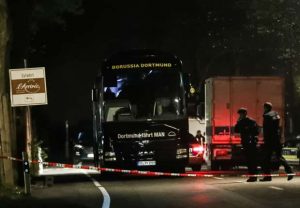From tragedy to sordid farce, terrorism is metamorphosing before our eyes. Until recently, an attack was meant to serve brutal, if basic, functions. These included terrifying a city or a country and serving as a propaganda vehicle for the terrorists’ political, social or cultural agenda. Now, the terrorist attack may be mutating into a speculative investment for monetary gain. The implications are worth considering.
On April 11, three bomb blasts hit a bus carrying popular German football team Borussia Dortmund to an important match. Three letters at the scene led officials to focus the investigation on two suspects “from the Islamist spectrum.”
A Borussia Dortmund player and an escorting policeman were injured; the match was rescheduled and eventually played under massive security precautions. Another football match in Munich was also subject to heightened security.
The sequence of events was greeted with anxiety and trepidation by fans and well-wishers of Borussia Dortmund, one of Germany’s most successful football clubs. Many wondered if terrorists would increasingly target sports entities and venues across Europe, a continent divided by much but united by the language of football.
After all, targets have generally been chosen for being vulnerable or symbolically significant. An adored football team is right up there with the Bataclan, the Nice beach, the Berlin Christmas market and the British Parliament. Then, with the arrest of a German- Russian man only identified as Sergej W., an extraordinary truth emerged.
The dual-national had audaciously sought to make money off the attack on Borussia Dortmund. He had faked the incident to appear like a terrorist attack, which is to say an act of violence that could cause mass injury, loss of life and considerable damage to property, followed by confusion and a claimed connection to radical Islamists.
On the day of the attack, Sergej W. purchased several options in Borussia Dortmund stock, betting heavily on a fall in its share price. The coincidence of share options purchases on the same day as the bomb blasts led police to Sergej W. and his cynical game plan was revealed.
As it happened, he didn’t briefly benefit monetarily either. “A significant share price drop could have been expected if a player had been seriously injured or even killed as a result of the attack,” prosecutors said. Neither of those events came to pass.
Surely this case, with its bizarre motivation and outrageous fakery, should merit no more than a shrug and a platitude? Something along the lines of “truth is stranger than fiction” should do nicely before everyone — police, press and public — returns to contemplating the real terrorist threats that menace Europe.
On the contrary. The faked terrorist attack is a dangerous development. A petty crook notes the knee-jerk way in which we respond to terrorist attacks today and calculates that it will be easy to misdirect the police towards unspecified Islamist troublemakers. This raises the possibility of people committing crimes of passion or for profit and laying out a false trail of clues that point to jihadist involvement. Even worse, the Islamic State or whichever jihadist group is implicated from afar may opportunistically claim responsibility.
Even if, as happened with Sergej W., the perpetrator is unmasked, clues that point to radical extremists will waste police resources and spread considerable panic. There is always the possibility that a faked terrorist attack might be seen as the real thing.
The implications are disturbing.


